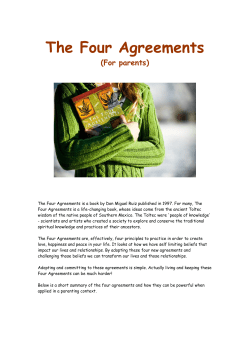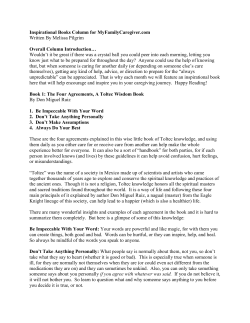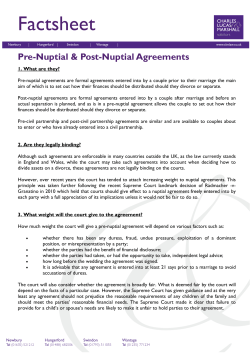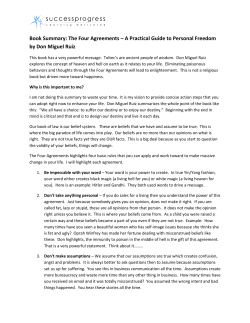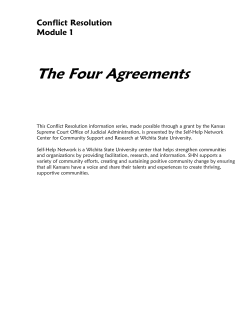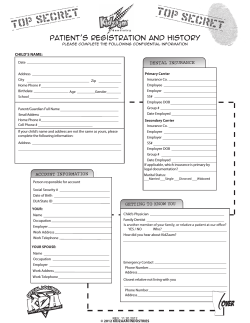
Anti-Poaching Agreements: Study of Jurisprudence in USA, Singapore and India
Anti-Poaching Agreements: Study of Jurisprudence in USA, Singapore and India Prachi Gupta∗ There goes a saying, “If you don’t take care of your people, someone else will.” It holds true in the highly competitive world where the job market is full of experienced professionals, constantly in search of better work profiles and career opportunities and equally enterprising employers who want the best of the hands for their organisations. It is then when the anti-poaching or cold calling agreements or understandings come into play. Many jurisdictions like USA, Singapore and India have held such anti-poaching or cold calling agreements to be anti-competitive or restrictive of trade. This article attempts to discuss the law relating to such antipoaching agreements in light of the recent investigations initiated by Department of justice, USA against Adobe, Apple, Pixar, Google, Intel etc. India has yet to witness an action against anti-poaching understandings under the Competition Act, but the stand of the Indian Courts is already well pronounced, rendering such agreements as void ab initio under provisions of Indian Contract, 1872. Introduction Employee poaching or employee raiding takes place when a company hires an employee from a competitor company. Employee poaching often happens in the IT industry because of high-demand technical skills but there is hardly any industry which has not witnessed employee poaching between competitors. When an employee leaves an organisation, he takes away with him his own competence and experience, which a part of investment made to human capital by his employer, acquired through training programs, formal or informal. At times, some employers also suspect their employees of taking business relations and confidential informations to their new employers, irrespective of the non-compete agreements between employer and employee. Often non poaching agreements have been confused with non-compete agreements. A non poaching agreements is different from non-compete agreements, where unlike the non-compete agreements, which is between an employer and an employee, non poaching agreement is between two employers. A non-compete agreements restricts the employee from seeking employment with a rival or other company, whereas, on the other hand, non poaching agreements refrain’s other companies from poaching into each other’s talent pools. A non poaching agreement confers fair protection upon the parties to the agreement by setting out guidelines to be followed in case of lateral hiring. Furthermore, it does not restrain an individual from exercising a lawful profession, nor does it restrict an individual from joining another company, or carrying out the same profession. It simply requires a company to first take permission of the company from which it wants to recruit. This is in conformity with law, as (a) it is not in restraint of trade and (b) it also protects the interest of the company from which the employee is being recruited as it gives time to a company to find replacement, which would be difficult in case of poaching.1 The question arises “Can employers agree amongst themselves to not hire the employees of their competitors?” The Answer is No. In 2009, the Department of Justice in USA initiated investigations against allegations of such anticompetitive agreements amongst a number of big companies, including Apple, Intel, Walt Disney, Adobe, Google etc. In high technology sector, there is a strong demand for employees with advanced or specialized skills. One of the principal means by which high tech companies recruit these types of employees is to solicit them directly from other companies in a process referred to as, “cold calling.” This form of competition, when unrestrained, results in better career opportunities. According to the complaint by the Anti-Trust Division of Department of Justice, the companies engaged in a practice of agreeing not to cold call any employee at the other company, by way of entering into agreements which were actively managed by senior executives of these companies. The complaint alleges that the companies’ actions reduced their ability to compete for high tech workers and interfered with the proper functioning of the price-setting mechanism that otherwise would have prevailed in competition for employees. None of the agreements was limited by geography, job function, product group or time period and were broader than reasonably necessary for any collaboration between the companies. ∗ Advocate & Legal Expert at Competition Commission of India. She may be reached at gupta.prachi@hotmail.com. Civil complaints were filed against these companies2 followed by civil complaints and settlement agreements3. The agreements between Apple and Google, Apple and Adobe, Apple and Pixar and Google and Intel prevented the companies from directly soliciting each other’s employees. An agreement between Google and Intuit prevented Google from directly soliciting Intuit employees. The Department of Justice said that the agreements eliminated a significant form of competition to attract highly skilled employees, and overall diminished competition to the detriment of affected employees who were likely deprived of competitively important information and access to better job opportunities. The agreements have the effect of restraining competition without any procompetitive justification and distorted the competitive process. Traditionally employers have used both incentives and disincentives to keep their employees from leaving. “Incentives” include compensation (salary, bonuses, benefits packages, and employee-specific perks) and working conditions. “Disincentives” include post-employment conditions in an employment agreement that make leaving relatively less attractive. For example, an employment agreement might include a non-compete covenant (employee agrees not to pursue a similar profession or trade in competition against the employer within a stated geography for a specified time), a customer nonsolicitation covenant (employee agrees not to solicit employer’s customers, but is otherwise free to compete, and is free to make unsolicited sales to employer’s customers), a co-employee non-solicitation covenant (employee agrees not to solicit former co-employees to leave the company), and confidentiality agreements (employee agrees not to take, use, or disclose employer’s confidential information).4 The disincentives are an agreement between employer and employee, more like a deterrent or hindrance to employees from leaving the employer. Agreements between Competitors A number of employers have tried this approach but have miserably failed. In Nichols v. Spencer International Press, Inc.,5 two competitors in business of sale of encyclopaedias and books had a “no switching” agreement between them, under which they refused to permit employees to work for their competitors and similarly refused to hire employees of any competitors. The Court rejected the contention that Section 6 of the Clayton Act, immunized this agreement. The Court held that agreements among supposed competitors not to employ each other’s employees not only restrict freedom to enter into employment relationships, but may also, depending upon the circumstances, impair full and free competition in the supply of a service or commodity to the public. No-Switching Agreements between Competitors An employer usually dreads the prospect of his employee switching to a competitor employer i.e. joining the business of a competitor, fearing that the employee’s knowledge and relationships can damage the former employer’s business and relationships. In American Express Bank Ltd. v. Ms. Priya Puri,6 the High Court of Delhi refused to believe the contention of the Bank that defendant employee had taken confidential information and data of bank and opined that rights of an employee to seek and search for better employment are not to be curbed by an injunction even on the ground that she has confidential data as per the facts and circumstances. Such an injunction will facilitate the plaintiff to create a situation of ‘once a customer of American Express, always a customer of American Express.’ In the garb of confidentiality the plaintiff cannot be allowed to perpetuate forced employment. It is well settled in many jurisdictions that employment agreements or understanding agreements between employers are not a solution to prevent employees from leaving, but on the contrary are construed by the courts to hamper and constrict the professional and intellectual freedom of the employees. Hence, purely naked non-solicitation clauses between businesses are void and run contrary to anti-trust laws, non-solicitation clauses between businesses and their employees, and between Singapore In Singapore, Courts have adopted a stringent approach towards restraint of trade clauses in employment agreements, including non-solicitation clauses. Essentially, Courts have held bare restraint of trade clauses “as being contrary to public policy and hence illegal”, and unenforceable. However, all is not lost; a non-solicitation provision contained in an employment agreement may still be upheld if it satisfies the three criteria below: • The clause protects a legitimate proprietary interest of the employer; • The clause is reasonable as between the parties; and • The clause is reasonable in the public interest. From the above, what is clear is that businesses must take great care in drafting restraint of trade clauses to ensure that such clauses are not declared void and unenforceable. Further, a well crafted nonsolicitation clause can be an effective tool and function effectively to protect the legitimate interest of the employer.7 Anti-Poaching agreements between Employers Similar to the no-tolerance approach adopted by Singapore Courts in employment agreements, a similar approach has been adopted towards non-solicitation clauses or other forms anti-poaching arrangements between employers if there is no genuine interest intended to be protected. Section 34 of the Competition Act of Singapore8 passed in 2004, prohibits an agreement between competitors not to solicit each other’s employees as anti-competitive. Such agreements are also considered as having an adverse effect on competition. However, there are few exemptions where an anti-competitive agreement will be deemed acceptable. Like in situations where there is net economic benefit to be derived from the restriction or the restriction is such that it is “directly related and necessary to the implementation of a merger”. To further strengthen the law, onus to establish or justify a non-solicitation or other restrain between employers or even net economic benefit is on the employers. Class Actions and Private Actions in Singapore Class Actions against anti-poaching agreements - In Singapore, regulatory rules allow for class actions by group of persons who are affected. The Singapore Rules of Court, Order 15 Rule 12 provides for a representative action, “where numerous persons have the same interest in any proceedings, the proceedings may be begun, and, unless the Court otherwise orders, continued, by or against any or more of them as representing all or as representing all except one or more of them.” Private Actions against anti-poaching agreements Under Singapore’s Competition Law, a person who has suffered any loss or damage directly as a result of the substantive violation of the Competition Act has a right of action in civil proceedings against the undertaking which is the subject of a decision by the Competition Commission of Singapore. Hence, where the Competition Commission of Singapore finds that a non-solicitation clause between competing businesses infringes provisions of Section 34, the businesses could be the subject of a private action by its employees. As of now, there have been no private actions for infringements of the Competition Act but it is a possibility that cannot be ignored.9 In a nutshell, employers in Singapore must be cautious when entering into non-solicitation arrangements to avoid contravention of the Section 34 Prohibition of the Competition Act. Apart from the financial penalties that may be imposed by the Competition Commission of Singapore, employers may also be subject to a private action or a possible class action by their employees which could result in negative impact on the company’s business performance, public image and reputation. India Every employer prefers to hire employees who are already experienced and equipped with skills, suited to the job, rather then employ fresh recruits, and train them to make them employable. As in 2010, Indian IT industry approximately spends Rs 3,000 crores every year on training fresh graduates. The Indian IT sector is also facing serious problems of employee attrition, a situation faced by an employer when his employees leave due to job dissatisfaction, new opportunities in the market, better compensation etc. before coming into force of the Competition Act, 2002, the enforceability of a Non Poaching Agreement was tested under the provisions section 27 of the Indian Contract Act, 1872 which holds any agreement restraining an individual from exercising a lawful profession, trade or business of any kind to be void. Indian Contract Act considers restraint to be reasonable if it affords fair protection to the parties and does not interfere with the public interest. India has yet to witness an action against anti-poaching agreements under the purview of Competition Act, 2002 but a number of legal proceedings have already been initiated under Section 27 of the Indian Contract Act, 1872. In Gujarat Bottling v. Coca Cola Company10, the Supreme Court held that a man is entitled to exercise any lawful trade or calling as and where he wills, as long as it is not against public policy or interest. It further held that under Section 27(a), a restrictive covenant extending beyond the term of the contract is void and not enforceable, (b) the doctrine of restraint of trade does not apply during the continuance of the contract for employment and is applied only when the contract comes to an end, and (c) this doctrine (Section 27) is not confined only to contracts of employment, but is also applicable to all other contracts. In Pepsi Foods Ltd. and Others v. Bharat Coca-cola Holdings Pvt. Ltd. & Others11, there was a negative covenant clause in employment contract, restraining an employee from engaging or undertaking employment for 12 months after he has left the plaintiffs’ service. The Delhi High court held that it is well settled that such post termination restraint, under Indian Law, is in violation of Section 27 of the Indian Contract Act. Such contracts are unenforceable, void and against the public policy. What is prohibited by law cannot be permitted by Court’s injunction. The Court further held that rights of an employee to seek and search for better employment cannot be restricted by an injunction. An injunction cannot be granted to create a situation such as “Once a Pepsi employee, always a Pepsi employee”. It would almost be a situation of ‘economic terrorism’ or a situation creating conditions of ‘bonded labour’. Every employee is entitled to right and freedom of changing employment for improving service conditions, which cannot be restricted or curtailed by a Court injunction. Inter-changeability of service is not an accepted norm of Service Jurisprudence which cannot be curtailed by a Court injunction nor can an employee’s right to terminate their contracts be curtailed by injunction. Though an injunction can be granted for protecting rights of plaintiffs, it cannot be granted to limit the legal rights of defendants. The court was of the view that the purpose behind Pepsi seeking injunction in the present case was only with the extraneous motives to prevent employees from changing employers. Lastly, the Court opined that in economic matters, while granting injunction, business realities have to be taken into consideration. The employees seek betterment and advancement of their careers, while they are in service. It is impracticable and unrealistic to artificially create a situation by a Court injunction when employees would first leave the employment and then look for better service conditions and job opportunities elsewhere. The Gujarat Bottling and Pepsi case, which were the beginning of the anti-poaching jurisprudence in India, clearly laid down that an employee cannot be made to work with a particular employer against his resolve or under a threat of legal action. The only exception is where an employee might divulge the confidential information of his previous employer.12 In Jet Airways (I) Ltd. v. Mr. Jan Peter Ravi Karnik, the Bombay High Court observed that terms and conditions of service of the defendants have been unilaterally altered by the plaintiffs to the detriment of the defendant. The Court held that non-grant of injunction would not cause any irreparable loss to the plaintiffs. Earlier it was the plaintiffs who had successfully poached 16 pilots from Sahara Airlines. The conduct of the plaintiffs was such that defendants had no resort left but to seek employment elsewhere and inconvenience which had been caused by leaving of services by the defendants was merely temporary and plaintiffs were not entitled to grant of any injunction. Competition Act, 2002 The Indian Competition law is still in its nascent stages but the impact has already been witnessed in several landmark rulings of the Competition Commission of India. The Competition Act, 2002 aims to (a) prevent practices that would have an adverse effect on competition, (b) promote and sustain competition in the market, (c) protect the interest of the consumer and (d) ensure freedom of trade. Section 3 of the Competition Act, expressly prohibits agreements which are anti-competitive in nature and restricts enterprises, association of enterprises or persons from entering into agreements which cause or may cause adverse affect on competition within India. Such agreements which contravene the above are considered void ab initio, i.e. void since inception. Non Poaching enterprises do not fall under the ambit of this section, as it does not ban lateral hiring, but instead sets guidelines to be followed in case of lateral hiring. Thus making the non-poaching agreements in conformity with the Competition Act as it (a) does not have an adverse effect on competition, (b) does not in any way un-promote competition, and (c) ensures freedom of trade as it does not restrict an employee from working for a competitor employer. Conclusion The law is well settled that any restrictions imposed on an employee during the employment are legally enforceable while the ones relating to post-employment period, which are meant to coerce the employee to not leave the employment or not join a competitor employer are null and void. Post-employment restrictions are rendered void by Section 27 of Contract Act. While there exists a number of precedents under Contract Act, there is no case where the matter has been examined by a Court or authority under the Competition Act, 2002. In the Desiccant Rotors International Pvt. Ltd. v. Bappaditya Sarkar and Another., the Delhi High Court observed that it is this attempt to protect themselves from competition which clashes with the right of the employees to seek employment where so ever they choose and in a clash like this, it is clear that the right of livelihood of the latter must prevail. Competition Act, 2002 is wider in scope compared to Contract Act. While Contract Act relates to contracts only, the Competition Act relates to any “agreement”. Moreover, while the only action open to a Court under Contract Act is to render the contract void, it is possible under the Competition Act to impose penalties on all those who make their employees sign such documents or enter into express or implied understandings, which impose post-employment restrictions on employees. It may also be possible to initiate class-action suits or proceedings under the Competition Act on behalf of employees in sectors where such agreements are common. While the position on post-employment restrictions regarding taking up employment or other competitive activities is clear, the issue of confidentiality of information and of intellectual property rights still remains an open area. An employee has the right to engage in any gainful activity after his employment ceases but not at the cost of all confidential intellectual property of the employer. Endnote 1 Validity of Non-Poaching Agreements, Divij Kumar, available at http://psalegal.com/upload/publication/assocFile/LaborBulletinIssueXI10062010111939AM_1288787650.pdf 2 United States v. Adobe Sys., Inc., filed Sept. 24, 2010), available at http://www.justice.gov/atr/cases/f262600/262650.htm; United States v. Lucasfilm Ltd., available at http://www.justice.gov/atr/cases/lucasfilm.html. 3 Available at http://www.justice.gov/opa/pr/2010/September/10-at-1076.html 4 No Poaching Allowed: Antitrust Issues in Labor Markets, by Michael Lindsay and Katherine Santon, Available at http://www.dorsey.com/files/Upload/eU_LE_antitrust_poaching_ 072412.pdf 5 371 F.2d 332 (7th Cir. 1967) 6 2006 (110) FLR 1061 7 Anti-Poaching Agreements – Prohibited Under Law? Kala Anandarajah and Dominique Lombardi, available at http://www.singaporelawwatch.com/slw/attachments/24036/Antipoaching%20agreements.pdf 8 Agreements, etc., preventing, restrict ting or distorting competition 34.—(1) Subject to section 35, agreements between undertakings, decisions by associations of undertakings or concerted practices which have as their object or effect the prevention, restriction or (2) (a) (b) 9 10 11 12 distortion of competition within Singapore are prohibited unless they are exempt in accordance with the provisions of this Part. For the purposes of subsection (1), agreements, decisions or concerted practices may, in particular, have the object or effect of preventing, restricting or distorting competition within Singapore if they — directly or indirectly fix purchase or selling prices or any other trading conditions; limit or control production, markets, technical development or investment; (c) share markets or sources of supply; (d) apply dissimilar conditions to equivalent transactions with other trading parties, thereby placing them at a competitive disadvantage; or (e) make the conclusion of contracts subject to acceptance by the other parties of supplementary obligations which, by their nature or according to commercial usage, have no connection with the subject of such contracts. (3) Any provision of any agreement or any decision which is prohibited by sub-section (1) shall be void on or after 1st January 2006 to the extent that it infringes that subsection. (4) Unless the context otherwise requires, a provision of this Act which is expressed to apply to, or in relation to, an agreement shall be read as applying, with the necessary modifications, equally to, or in relation to, a decision by an association of undertakings or a concerted practice. (5) Subsection (1) shall apply to agreements, decisions and concerted practices implemented before, on or after 1st January 2006. Anti-Poaching Agreements – Prohibited Under Law? Kala Anandarajah and Dominique Lombardi, available at http://www.singaporelawwatch.com/slw/attachments/24036/Anti-poaching%20agreements.pdf MANU/SC/0472/1995: AIR 1995 SC 2372: 1995 (2) UJ 698 81 (1999) DLT 122 Shankar Golikari v. Century Spinning and Manufacturing Co. Limited, (1967) ILLJ 740 SC.
© Copyright 2025


